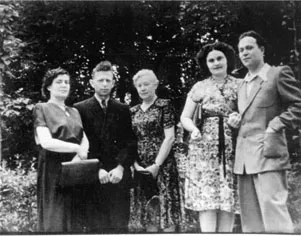Elizabeth Waiser’s family
My family after my wedding. From right to left: my husband David Waiser, I, Elizabeth Waiser, my husband's aunt Rachel Waiser, my husband's distant relative Joseph Waiser and my husband's sister Clara (Khaya) Waiser. Photo made during a walk in the central park in Chernovtsy in 1954.
In 1953 after my mother died I went to see a friend of mine in Chernovtsy. She asked me why I looked so sad. I told her that my mother died and my heart was broken. She poured me a cup of tea and asked me to wait while she went to see her acquaintance. This acquaintance happened to be a sister of my future husband. She lived with her brother and their aunt Rachel. My friend went to see her acquaintance and left a note for my future husband to come and see her as soon as he came home from work.
In less than an hour the door opened and my future husband came to see my friend still wearing his working clothes. He wasn't handsome, but he had a very good and kind face. My friend introduced him to me and he said that he was lonely and wanted to have his life organized. He also expressed 3 requirements to his future wife. She was to be a good housewife(I told him that I was good at housekeeping, I learned everything from my mother.. Then he said that she had to know how to handle money. I also learned from my mother to save money and handle it well. His 3rd requirement to his future wife was to be a beautiful woman. I said to him 'As for this, it will be up to you". I had long legs and a mop of thick hair. He asked my permission to meet my father and ask for his consent to our marriage.
My husband David Waiser was born in Dombroveny village in Rumania in 1923. He could hardly remember his parents. They died when he was a small boy. His older sister Haya -Clara in Russian, raised him. During the war Clara was in evacuation in Karaganda. She worked at a coal mine. David was in infantry at the front. After the war he returned home where he was told that their house was ruined and his sister moved to Chernovtsy. David came to Chernovtsy and got a job of laborer at the 'Vostok" factory manufacturing domestic chemicals.
We got married within a month. I didn't know him. But I took the risk. I always dreamed to have a hardworking husband. I didn't want an intellectual. We didn't have a wedding. We had a civil registry ceremony and his sister made a small dinner at his home. My mother saved all the money I was earning after the war in a bank. When we got married I gave this entire amount to my husband. I also packed my belongings and we moved them to Chernovtsy. In Chernovtsy I went to work as telephone operator and worked there until I retired in 1986. I did well at work and got along well with my colleagues.
We received a dwelling in a basement from the factory. We've lived here all our life. We renovated it for the money that my mother had saved for me. David was very handy. There was nothing he couldn't do. He was good at welding and was a good tinsmith. He could fix sewing machines and was a good electrician and plumber. He did everything at home. He also helped other people to fix things.
My husband's aunt Rachel, his father's sister, was a communist during the Rumanian rule. When the Soviet power was established she was sent to Siberia. She was good at sewing and she worked as a seamstress in exile. After she was released she returned to Chernovtsy. She was a presser at the garment factory. My husband asked my permission to have them move in with us. I had no objections and they moved into this dwelling. Aunt Rachel was looking after our son and we all went to work.
My son was born in 1955. We named him Efim after my husband's father.
My husband and I came from religious families. We always believed in God like our parents taught us. We observed all Jewish traditions in our family. We fasted before Rosh Hashanah and Yom Kippur and celebrated Pesach. I was a good housewife and had all traditional food made on holidays. I cooked Gefilte fish like my mother taught me. We worked at Shabbat, because Saturday was a working day. But I always cooked on Friday. In the evening my husband and I prayed and I lit candles and only then we sat down to dinner.
On holidays my husband and I went to the synagogue. We didn't go to synagogue on Saturday. My husband and I spoke Yiddish and Russian at home. We spoke Russian to our son, but he has heard Yiddish since he was a baby and so he learned it himself. We also celebrated Soviet holidays and got together with our neighbors in the yard. We sang Soviet songs and went to parades.







